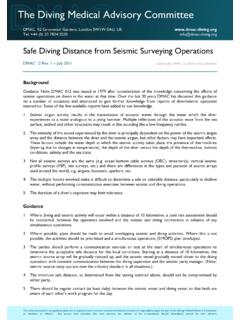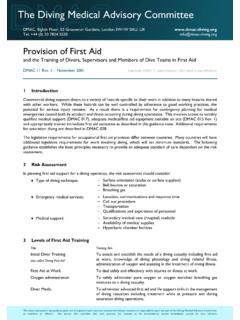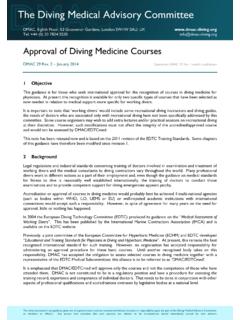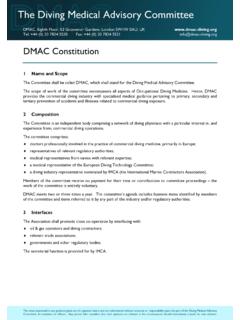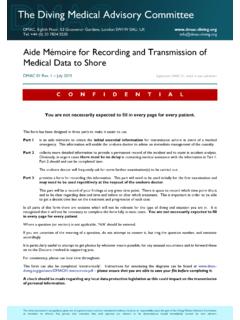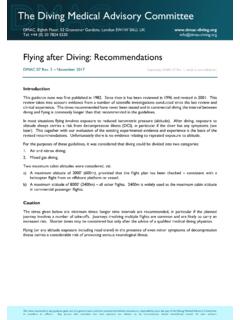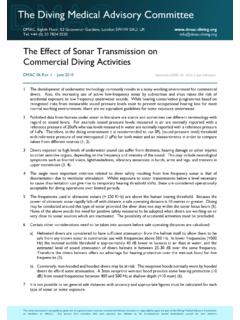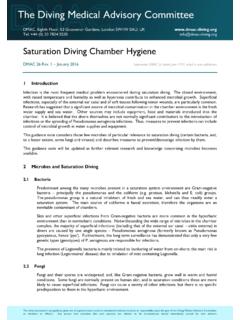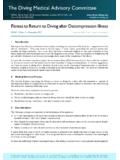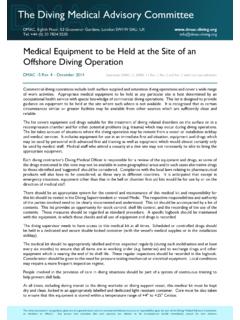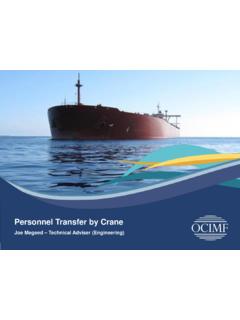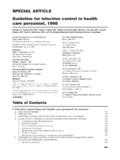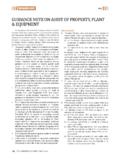Transcription of The Diving Medical Advisory Committee
1 The Diving Medical Advisory Committee DMAC, Eighth Floor, 52 Grosvenor Gardens, London SW1W 0AU, UK Tel: +44 (0) 20 7824 5520 The views expressed in any guidance given are of a general nature and are volunteered without recourse or responsibility upon the part of the Diving Medical Advisory Committee , its members or officers. Any person who considers that such opinions are relevant to his circumstances should immediately consult his own advisers. The Provision of Emergency Medical Care for Divers in Saturation DMAC 28 Rev.
2 2 December 2014 Supersedes DMAC 28 and DMAC 28 Rev. 1, which are now withdrawn DMAC 28 also superseded DMAC 25 and DMAC 27. 1 Background DMAC has published guidance over a number of years aimed at providing divers in saturation with a level of Medical care which is as similar as possible to the level of Medical care available to other personnel who work offshore. In the early days of the offshore Diving industry it was considered desirable to transport (under pressure) an ill or injured diver in saturation from an offshore location to an onshore facility which would provide specialised Medical care.
3 As experience was gained however, it became clear that it was much better to retain the casualty at the offshore work site and transport Medical equipment and personnel to the casualty. This has now become the accepted method of operation. In many cases the most practical concept is to stabilise the patient until suitable decompression allows definitive care under atmospheric pressure. DMAC published Guidance Note 25 in October 1993 and raised this to Revision 1 in March 1996. Guidance Note 27 was published in April 1996.
4 Guidance Note 28, published in November 1997, superseded all three previous notes, and aimed to combine the advice which they contained in to one succinct source which can be applied anywhere in the world. This revision of DMAC 28 updates that advice to reflect current practice and equipment. Whilst this document gives general guidance, detailed arrangements should exist for each work site, agreed and documented between the Diving company and its specialist Medical adviser. 2 Geographic Limitations It is recognised that the location of the Diving operation will determine the facilities which are readily available to provide expert Medical care.
5 For example, in the North Sea such skilled care will often be available within an hour or two while in other parts of the world specialised doctors may be thousands of miles away from the Diving site. Prior to the commencement of any Diving operation the Diving company should consult with its Medical adviser (possibly also with the client s Medical department) and agree what facilities and equipment should be available in relation to the specific location. In remote locations there may be more benefit from ensuring that good communications are available than from the provision of specialised Medical equipment on site.
6 Whilst the advice given in this document is intended to apply anywhere in the world, it is recognised that there will be differences in the ability to implement its recommendations dependent on the exact location and circumstances. 3 Contingency Planning The equipment that each of the various personnel with a role in providing Medical care in an emergency ( diver, diver medic, members of the Medical support team) is capable of using should be agreed by the Diving company and their Medical adviser, and this should be taken into account when developing the contingency plan.
7 Anyone expected to use a certain piece of equipment should be familiar with and trained in use of that equipment. Page 2 December 2014 DMAC 28 Rev. 2 4 On Site Medical Arrangements The equipment available at site and the ability of those present to provide adequate first aid and resuscitation within the first few minutes and hours of an incident will ultimately determine the outcome for the patient. DMAC has published guidance on the equipment which should be held at an offshore worksite (see the latest issue of DMAC 15).
8 The use of properly trained diver medics is now widespread but the selection and training of suitable personnel from among the divers to provide advanced first aid is crucial to the success of any Medical treatment. The Diving company should prepare, in conjunction with its Medical adviser, a well documented plan to provide initial first aid to an injured diver while at the same time contacting specialist Medical personnel for advice. This plan is intended to stabilise a casualty until such time as a decision is taken as to what further treatment may be needed.
9 5 Suitability of Medical Teams The highest level of Medical care will be provided by a Medical team which is trained and experienced in handling casualties under saturation conditions. This level of specialist knowledge is not widespread throughout the world and is often concentrated in specific locations which may be a significant distance away from the work site. Medical care involves a very wide range of specialist expertise and no Diving Medical team will have a complete range of expertise.
10 As a result, Medical teams providing support to saturation Diving operation need to be able to access a wide range of specialist expertise for guidance and assistance. It is recognised that the need for such specialist expertise occurs very rarely and hence is unlikely to be met by a contractual arrangement. Effective monitoring of the patient by the onsite diver medic using simple monitoring equipment, coupled with direct communications ( audio, video, photographic links and email) between the specialist doctor ashore will form the basis of care given to the casualty in the first instance.
